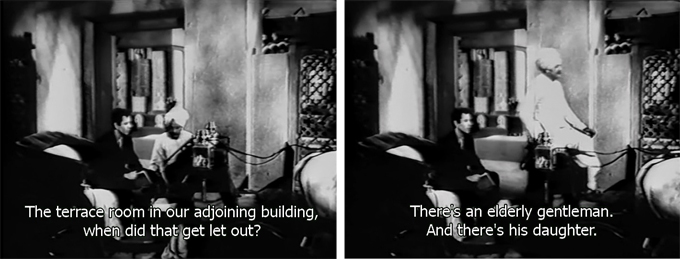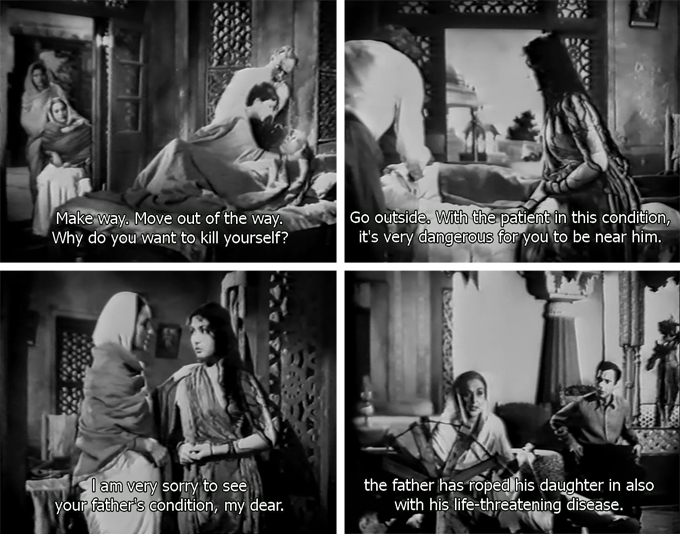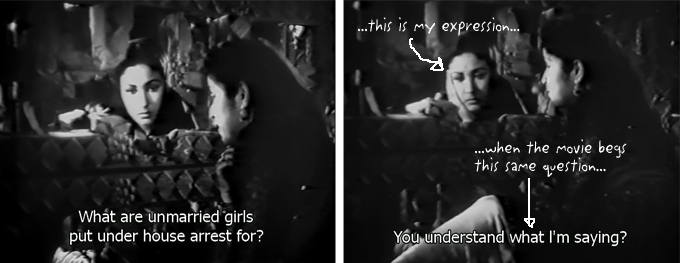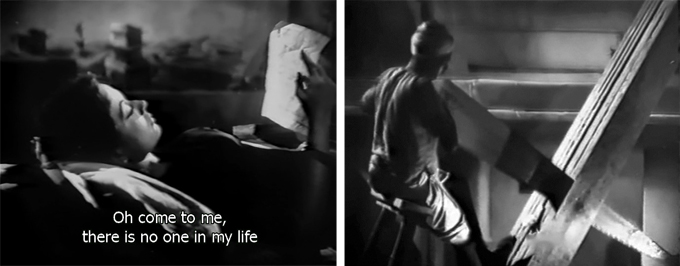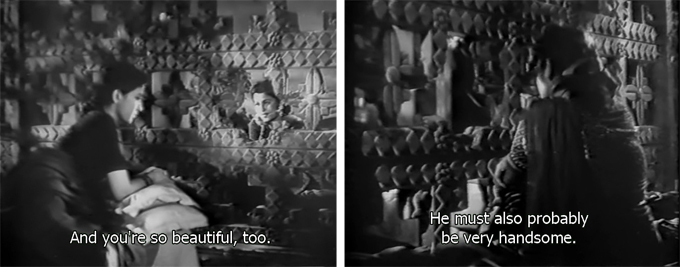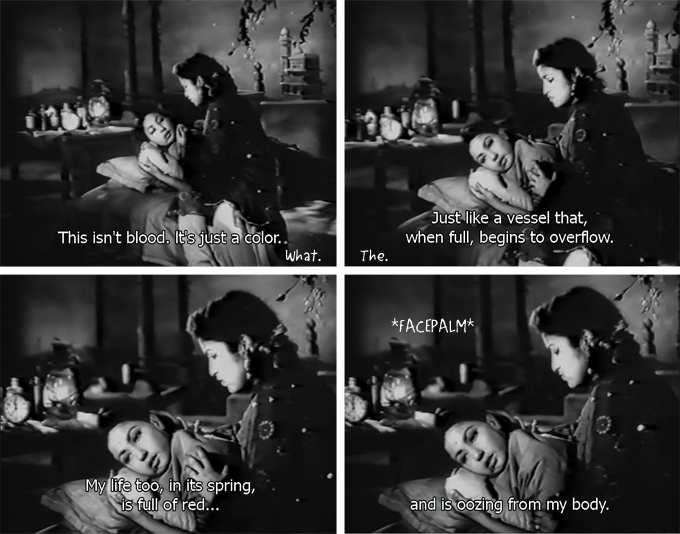This is one of the strangest films I’ve seen in a very long time. It clocked in at a little over 2 hours, so I am not sure if there were pivotal scenes missing or what, but I spent the entire time feeling like I was playing catch-up and losing rather badly. Certainly Kamal Amrohi had a lot he wanted to convey, but he seemed to also want to keep us guessing at whatever it was. It did strike me that it is a movie about assumptions: assumptions that the characters and the audience make are turned over and inside out one by one. That could have been interesting; but the story is excruciatingly slow and largely unrewarding, like watching paint dry in the burning sun on a hot sticky day (but slower and more agonizing) and then realizing the color has turned red instead of the blue you wanted.
One of my major issues with it is that none of the characters are terribly well-developed, so that instead of being involved with their stories I feel much more like a neutral spectator, held at arm’s length from any real emotion. That could have been intentional, but it doesn’t work for me. My favorite thing about the film is probably the music, composed by the hitherto unknown to me Jamal Sen. It is pretty mournful (the whole thing is really), but very very beautiful indeed from the opening title music to the end.
The film begins with an elderly man (M Kumar), clearly very ill, knocking on the door of a doctor’s house late at night. He is informed that the doctor is away, and ferried with his silent female companion to a guest-house run by Maaji (Protima Devi). She gives them a vacant room with a terrace, where the girl Sheetal (Meena Kumari) beds down while the old man sleeps inside. Maaji’s son Shravan (Nasir Khan) sees Sheetal sleeping from his neighboring terrace and falls so hard for her that he is completely unable to concentrate on an exam the next morning. He asks servant Bihari who the guests are.
Maaji figures out pretty quickly that her son is smitten by the new tenant’s daughter. This isn’t much of a challenge since he now spends all of his time on his own terrace mutely staring across at her as she lies motionless on her bed, while neighbors sing a very lovely bhajan nearby. The bhajan is Sheetal’s theme song, repeated throughout the film: “Oh Lord you are my refuge; I have entrusted myself to you.”
Maaji understands her son’s feelings, but is not very happy about them and I’m not clear why. She is cryptic, a quality just about everyone in this movie shares. Even the dialogue which occasionally punctuates the long silences is abstruse much of the time. Maybe it’s just not done for a man to be staring at a strange woman, even if she is out there in plain sight; maybe Maaji feels that she is beneath them status-wise. I have no idea. I have questions, only questions.
She is also unable to speak to him directly about her disapproval, sending a servant with her message instead.
Shravan sends a message back to his mother that she’s not to worry, nobody will ever know about his feelings (I laugh to myself and say “Ha! Unless they see him on his terrace!”).
Sheetal herself seems oblivious to Shravan, unmoving and staring into space from her bed. When the doctor (Jankidas) finally arrives she lets him in; I am relieved to know that she can actually get up. Although the old man pretty clearly is suffering from tuberculosis (in the immortal words of Monty Python “He’s coughin’ up blood!”), he puts the blame squarely on a powder that he is taking. Sheetal sits silently, shielding the candle flame from his gusty coughing and gently sponging blood from the corner of his mouth. The old man explains his problem, slightly ashamed but also a little boastful.
The doctor is shocked to discover that Sheetal is the old man’s wife and not his daughter as everyone so far (including probably anyone who hadn’t read a plot synopsis before watching, although I had) has believed.
The doctor is saddened to see that she is also suffering from tuberculosis, as he finds her coughing on the terrace outside the room. He gives her medicine for both of them, and chastises her for sleeping out in the open; it will only make her illness worse. That evening as Sheetal goes to sleep, Shravan stares at her from his balcony, singing a love song that he’s penning to paper. When he goes inside, the paper blows across the space between the buildings. This poor manuscript blows around unnoticed for a good hour, getting hung up in trees and temple roofs and stepped on by an oblivious Sheetal.
The next morning Maaji comes to visit her new tenants, and the old man has an uncontrollable coughing fit which causes her to send for the doctor. Sheetal is tending to her husband as he arrives, and he scolds her; Maaji watches the goings-on with some sympathy if not comprehension. Sheetal does not bother to disabuse her of her misunderstanding, but Maaji returns home with bad news for her love-struck son. She doesn’t want the light of her household to marry a terminally ill woman (who can blame her really?).
By now I feel like getting details of plot out of this film is like undergoing a root canal: painful and really really endless. Shravan continues to mope and watch Sheetal’s every move (which isn’t many, as she mostly lies in bed), and I realize that I don’t much care for him: he is gloomy, spineless and self-pitying. In point of fact nobody here is much fun, as Sheetal tends to her husband, wracked by coughing, between her own bouts of weeping and hopeless staring into space from her bed. A new character now enters the picture in the form of Gomti (Roopmala), a neighbor introduced in much the same supine way as everyone else, but who turns out to be a bit more lively thank goodness when she befriends Sheetal.
She even manages to engage Sheetal in conversation, eliciting the information from her that she’s here with her husband seeking medical treatment. Sheetal asks her some questions in return, and Gomti tells her that she has come back to her maternal home in disgrace, having fallen in love (and probably more, although it isn’t ever made clear).
That night Shravan’s piece of paper FINALLY lands on Sheetal’s bosom, forcing her to notice it as the song plays again. I roll my eyes at the lyrics and scribble in my notepad: “No one except your mother and your servants and the friends you’d have at school if you’d get off that balcony.” Sheetal herself is unimpressed. She tosses it aside after finishing it, and turns over on her side to go back to sleep. Or cough. Whatever.
These guys sawing huge slabs of lumber (in the middle of the night) now make an appearance, and again I never figure out what they are supposed to symbolize, and nor do I much care (they show up later too). Sheetal’s husband—who is doing much better with the medication the doctor has been sending and Sheetal has been getting up at 4 am to administer—now has to leave for a couple of days and return to their home to collect his pension (some commentary on government bureaucracy figures here and is less ambiguous than other dialogue).
She is left to herself and the company of mischievous Gomti, who has made her own assumptions about the husband she has yet to see.
Sheetal is not taking her own medication but throwing it away, and wakens Gomti one night with her hacking cough. Gomti calls for the doctor and goes to Sheetal’s bedside (still out in the open night air, against the doctor’s wishes). It’s clear that she is bent on killing herself.
No wonder Meena K began drinking. I am sorely in need of a cocktail myself at this juncture and if this film is any indication of Amrohi’s moods at home I cannot blame her one bit.
The Doctor Sahab has questions too after finding her discarded medicines, and draws his own conclusion from her enigmatic answers.
He consoles her that her husband is getting better for her sake, that he loves her but as usual, Sheetal’s expression remains blank. I am tired of her, tired of her coughing husband, tired of the whole movie but I soldier on. Is she unwilling to live as a widow? I wonder. Or is it the prospect of her husband actually getting better that’s depressing her? Sophie’s Choice!
Meanwhile, Shravan continues to pine to the point where he falls OFF his balcony, severely hurting himself. Maaji, still laboring under the assumption that Sheetal is the old man’s daughter, decides that enough is enough and sends for the old man in order to fix Sheetal’s wedding to Shravan.
What will happen when she discovers the truth? Why does Sheetal really want to die? Does she love Shravan from afar? Why are the only people I ever like in movies like this the “disgraced” ones (kind Gomti)?
At one point, my mother (the poor thing was sleeping through watching it too) turned to me and said: “Well, this certainly is not Bollywood, is it?” Possible debate on what actually defines “Bollywood” aside, I knew what she meant. There is absolutely nothing and no one joyful, warm, loving or even likable in this film (except Gomti). Meena’s Sheetal remains a mystery, shuttered, sad, hopeless—we never get to know anything about how, why, when or even what her relationship with her husband might be (beyond the “I worship him like a God” thing which is just irritating to me). Any message(s) Amrohi might be trying to send are mostly obscured by the coy dialogues, endless silences, and tortured characters. It must have been suffocating to be trapped in a theater with this movie; at least I could take some welcome breaks from all the pain and confusion when I wanted. There were some interesting twists towards the end, although I am still unsure how to interpret them. Again, possibly this was intentional…but I cared so little for anyone important by the end that I can’t be bothered to even try and figure it out.
Word on the internet speculates that it is the story of Amrohi’s own romance and marriage to Meena, 14 years his junior, but I don’t know. My feelings can be summed up by a trivia point found on imdb (whether it’s true or not I don’t know, because I’m not going to sit through it again): this film apparently holds a record for the longest closeup ever, on Meena Kumari’s face for 6 minutes and 30 seconds. She is beautiful, stunningly so, even with blood pooling under her cheek, but enough is enough.
I’m not sorry to have seen it, and it has given me a new favorite bhajan (“Devta Tum Ho Mera Sahara”) sung by Mubarak Begum and Rafi. Gorgeous!
But I am glad I never have to watch it again.
I think I’ll watch paint dry in the hot sun instead, and feel lucky.

